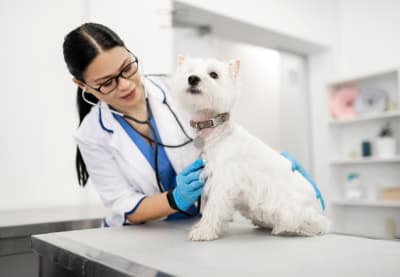As dog owners, we all dread hearing the word “cancer” when it comes to a vet’s diagnosis. In this post, our Huntersville vets explain skin cancer in dogs, symptoms and potential treatment options.
Skin Cancer: A Common and Treatable Disease in Dogs
No matter your dog’s breed or her age, there’s one word we all dread hearing as dog owners: “Cancer”. Whether you’ve seen a strange bump or lump on your pooch’s skin that you suspect may be cancerous or your vet has already diagnosed your dog with the disease, you are probably concerned.
While we recommend keeping your veterinarian as your primary resource for health-related issues, today we’ll share some basic information about skin cancer in dogs, so you can understand the condition better.
How do dogs get skin cancer?
Skin cancer is the most commonly diagnosed type of tumor in dogs. This is because the disease is easier to see with the naked eye than some other types of tumors (which may require x-rays and diagnostic equipment to identify), and partly because solar radiation, chemicals and toxins in the environment can affect skin more easily than your dog’s internal organs.
The good news: This also works in your and your veterinarian’s favor - since the chances for early detection improve. Early detection is critical to effective treatment and positive outcomes. It also helps to have a number of treatment options and a good long-term prognosis.
What causes skin cancer in dogs?
Though genetics contribute significantly to your dog’s risk of getting skin cancer, other triggers may include certain types of viruses, amount of sun exposure, chemicals in the environment and hormonal abnormalities.
What are the different types of skin cancer in dogs?
Dogs have multiple layers of skin and are at higher risk for numerous types of skin cancer. These are three of the most common types of skin cancer in dogs:
Squamous Cell Carcinoma
Sun exposure is often the culprit for this type of aggressive cancer, though squamous cell carcinomas do not spread to surrounding lymph nodes. They can damage or destroy tissue surrounding the tumor.
Malignant Melanoma
Usually found in the mucous membranes or mouth, and sometimes on parts of the body covered by hair, malignant melanomas tend to grow very fast. They often spread to other organs, including the lungs and liver.
Mast Cell Tumors
These types of cancers develop within the mast cells of the immune system, and are the most common skin tumors in dogs. Though the cause for these is still debated, evidence indicates genetics are a factor, and hormones such as estrogen and progesterone may affect development.
What are signs and symptoms of skin cancer?
You may see different symptoms depending on the cancer. Typically, you’ll want to carefully monitor your dog’s skin as they age for abnormal bumps and lumps. Look for these signs:
- Indications that your dog is feeling pain, such as a limp
- Inflamed, rubber-like sores (mast cell tumors)
- Firm, raise wart-like blemishes (squamous cell carcinomas)
- Strange-colored bumps or lumps on the toenail beds, mouth, lips or pads of feet (melanomas)
You can’t be too careful with sores or other abrasions, as there’s a risk that they may be misdiagnosed as simple infections.
What are the treatment options for skin cancer in dogs?
At LakeCross Veterinary Hospital, we provide oncology services for dogs and other pets with cancer. Prognosis will depend on your dog’s unique set of circumstances.
After assessing your dog and performing diagnostic tests, your vet will determine the proper treatment for your dog’s skin cancer depending on the type of tumor and its location. Depending on how far it has progressed, surgery, chemotherapy, radiation therapy and other types of therapies or drugs may be options.
Note: The advice provided in this post is intended for informational purposes and does not constitute medical advice regarding pets. For an accurate diagnosis of your pet's condition, please make an appointment with your vet.
Do you have questions? Talk to our vets today.
Looking for a vet in Huntersville and Mecklenburg County?
We're always accepting new patients, so contact our veterinary hospital today to book your pet's first appointment.
Related Articles View All
Puppy’s First Vet Visit: Checklist & What to Expect
Set your new puppy on the path to good health by getting the most out of each vet visit. Here is what you can expect from your puppy's first vet visit, along with a checklist of things to take and questions to ask your vet.
Kitten's First Vet Visit: What to Expect
So you have just brought home a little bundle of joy. Congratulations! But make sure you're scheduling your first veterinary appointment, as well as routine exams going forward. To help you prepare, our Huntersville vets discuss what to expect at your kitten's first appointment.
How often should I take my dog to the vet?
Regular veterinary care including checkups, parasite prevention, and vaccinations are the key to keeping your dog healthy throughout their lifetime. But, how often should you take your dog to the vet, and how can you save money? Read on to find out.
Bladder Stones in Dogs
Broken jaws are an alarmingly common, and painful, injury in our canine companions. In today's post, you will learn some of the causes of a broken jaw in dogs, how they can be repaired, and a few tips on caring for your dog as their jaw heals.

